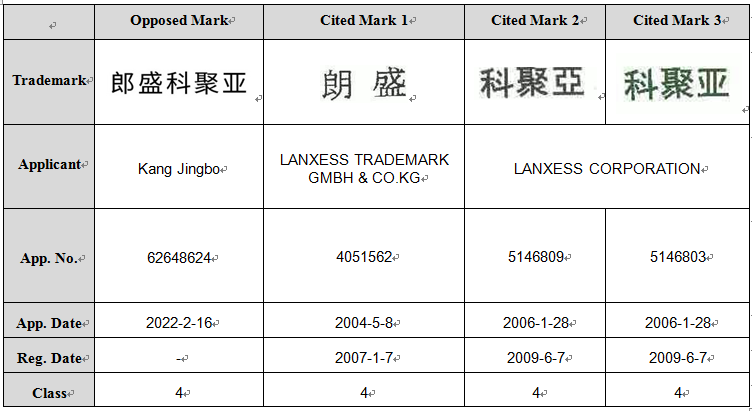
Abstract
We, Kangxin Partners, P.C., filed an opposition action against the trademark, 郎盛科聚亚(No. 62648624in Class 4) (“the opposed mark”) on behalf of LANXESS AG (“the client”) on November 21, 2022. The National Intellectual Property Administration, PRC (“CNIPA”) examined the case and decided to reject the opposed mark for registration.
Background
LANXESS AG is a leading specialty chemical company based in Germany, with a rich history dating back to 1863. It has a global presence with over 50 subsidiaries and joint ventures in various countries around the world. The client's global footprint allows it to serve customers in diverse industries, including automotive, construction, electronicsand agriculture, with high-quality specialty chemicals and advanced materials. The client is committed to developing sustainable solutions that help to address global challenges such as climate change, resource scarcity, and urbanization. With a strong focus on innovation, sustainability, and customer satisfaction, the client continues to drive forward as a leading player in the global specialty chemicals market.
The client has the trademarks "朗盛" and "科聚亚" in mainland, China over different goods and services, which are registered and managed by the subsidiaries, LANXESS TRADEMARK GMBH & CO. KG and LANXESS CORPORATION respectively. After more than 20 years of hard work, the client and their marks"朗盛" and "科聚亚" enjoy high reputation among the relevant public in mainland China, the marks "朗盛" and "科聚亚" also have formed corresponding relationship with the client. The opposed mark is the combination of our client’s two marks. Upon communication with client, we were entrusted to file opposition action against this trademark.
The comparison of the marks is as below:

Key Issues
In the opposition, we mainly argued that:
1) The opposed mark is similar to the cited marks, and their goods are highly connected with each other. Based on the high reputation of the cited marks in mainland China, the registration and use of the opposed mark over similar or similar goods is more likely to cause confusion and misleading among relevant public;
2) The opposed mark was filed in obvious bad faith by coping and imitating the cited marks, which violates the principle of good faith.
On October 16, 2023, the CNIPA issued the decision: the opposed mark's designated goods are not similar to those of the cited marks, thus, the marks of both sides do not constitute "similar marks over similar goods". But the evidence submitted by the opponents can prove the strong distinctiveness of the cited marks for "朗盛" and "科聚亚. Further, according to the ascertained fact, except the opposed mark, the opposed party also filed the marks, like “科聚亚大湖, 郎盛大湖, and etc.”, which are same or similar to the opponents' marks, which can hardly be a coincidence. Based on this, the CNIPA holds that the opposed party has subjective malice in copying and imitating the opponents' trademarks. Such action disrupts the order of trademark registration and the market economy order of fair competition, violates the principle of good faith. The registration and use of the opposed trademark may easily lead to the relevant public's misleading of the origin of the goods. Therefore, the opposed mark should be rejected for registration according to Articles 7 and 30 of Chinese Trademark Law.
Inspiration of the Case
From this decision, we can learn that the CNIPA now makes major effort to crack down the malicious registrations, which will give more protection on the real trademark owners’ rights. We should dig deep into the other party's bad faith with supporting evidence in the opposition / invalidation actions.
On the other hand, Chinese market becomes more and more important and popular in recent years, and more and more brands are paying high attention to the Chinese market. The brand owners should make early preparations for trademark protection before entering the Chinese market. We have seen many foreign brands which only cover their key goods / services on sale when filing trademark applications, which means that their trademark only has limited protection scope. To protect the distinctiveness of the brand in the market and reduce potential risk of confusion and misleading to be caused to the consumers, the true owners of the brands have to spend much efforts, energy, costs and time to clean up the bad-faith registrations, and when they want to enlarge the business scope and register trademarks over additional goods / services in China, the bad-faith registrations will bar their applications.
Thus, we recommend the brand owners filing defensive applications over related goods / services in China timely to 1) bar the subsequent bad-faith applications filed by third parties; 2) provide assurance for future business expansion; and 3) avoid possible infringement claims against the real owner (if the owner plans to use the mark over additional goods / services in China). China is a “first-to-file” country, meaning that generally, the first person to file a trademark application will have superior rights over that trademark. So we recommend the applicant filing defensive applications over related goods / services as early as possible.
We now offer two options of communication, i.e. traditional email instruction and our Kangxin IP Platform (https://eservice.kangxin.com), which both provide the same substantive services by our trademark attorneys, with the only difference in instruction manners. Since our platform is more efficient by automatic docketing, standard goods / services recommendation and automatic generation of POA as well as other smart tools, it is treated as a fast track, and we offer more favorable quotation for all services via our platform as compared with our standard fee charges.


Follow us






